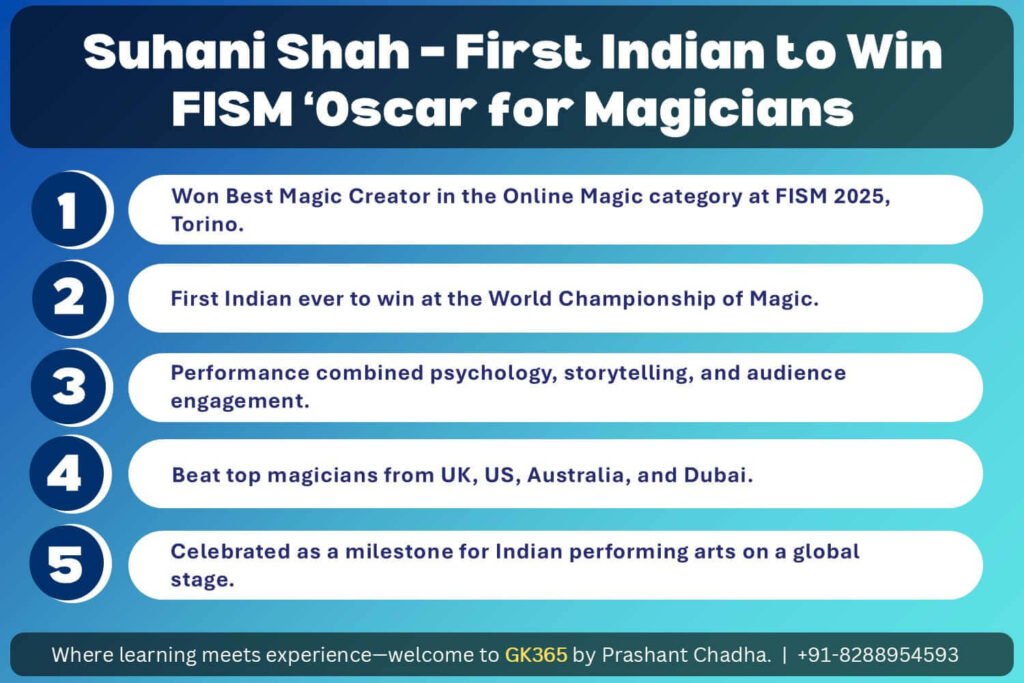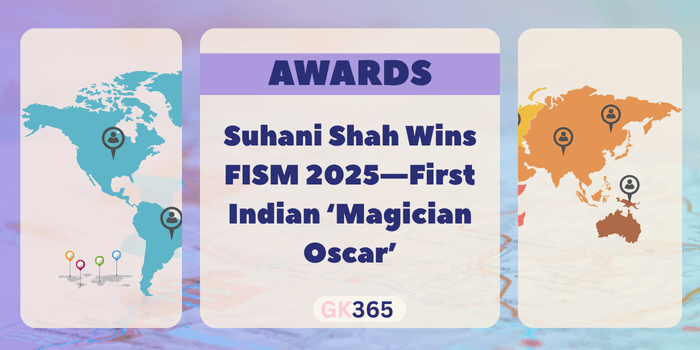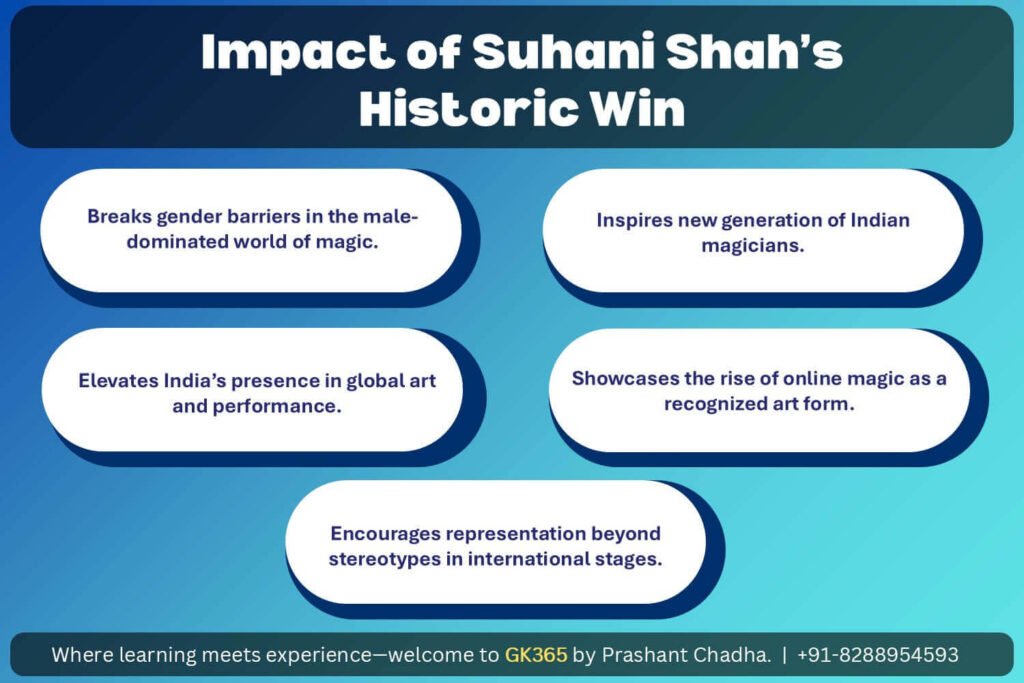Suhani Shah Becomes the First Indian to Win ‘Oscar for Magicians’ at FISM 2025
Table of Contents
- Introduction
- What is FISM?
- Suhani Shah: India’s Mentalist Prodigy
- The Journey to Torino
- The Winning Act
- India’s First FISM Winner
- The Global Stage: Competitors and Criteria
- Cultural Impact and Global Representation
- Online Magic and the Changing Face of Performance
- Public Reception and Media Spotlight
- Challenges Overcome
- Broader Implications for Indian Performing Arts
- Women in Magic: Breaking the Glass Curtain
- Conclusion
- Key Takeaways Table
Introduction
Suhani Shah made history at the 2025 World Championship of Magic held by FISM in Torino, Italy. She won the Best Magic Creator award in the online magic category. This marked India’s first win at the world’s top magic competition. Her victory pushed Indian performance and storytelling into global view.

What is FISM?
FISM stands for Fédération Internationale des Sociétés Magiques. It was founded in 1948 and is the most respected body in the magic world. Every three years, it hosts a World Championship. The event brings together top performers from many countries. People often compare it to the Olympics or Oscars of magic.
FISM covers several categories: stage magic, close-up magic, and online magic. Judging is strict. Magicians must meet high artistic and technical standards. Winning means you rank among the best.
Suhani Shah: India’s Mentalist Prodigy
Born in Rajasthan, Suhani Shah gave her first public performance at age seven. She performed for Gujarat’s then Chief Minister, Shankersinh Vaghela. That marked the start of her career.
She left school early and studied people instead—how they act, speak, and respond. Over time, she became India’s most known female magician. Her work combines psychology and storytelling. That combination gained attention worldwide.
The Journey to Torino
FISM 2025 ran from July 14 to 19 in Torino. Performers from across the world took part. Shah had to pass multiple rounds and qualify through regional events.
Her online magic entry stood out. It was fresh, well-written, and full of story. But it also spoke to a wide audience. Her ability to connect made a clear difference.
The Winning Act
Online magic has unique demands. Unlike live acts, the camera leaves no space for mistakes.
Shah’s act looked at how people make decisions under stress. She used common choices as hooks. Volunteers joined her live over the internet. Her mix of prediction, live interaction, and behavior reading worked well on video.
The act ended with a strong twist. A choice made early shaped the final result in a way that seemed impossible. Judges praised the act for its clear design, strong pace, and original idea.
India’s First FISM Winner
This was a first for India. Until now, no Indian had won at FISM. While India has a long history of magic—from streets to stages—it hadn’t earned global awards in the formal circuit.
Shah’s win changed that. She put India on the global map of magic. She also gave modern Indian magic a strong voice.
The Global Stage: Competitors and Criteria
Shah faced strong competition. She went up against artists like Jack Rhodes (UK), Jason Ladanye (US), Jason Maher (Australia), and Mohammed Imani (Dubai). Each had their own unique style.
FISM judges look for creativity, skill, performance, and audience impact. Shah excelled in all. Her biggest edge was how she blended Indian detail with global clarity.
Cultural Impact and Global Representation
The award means more than a trophy. It affects how people see Indian art. For years, Indian magic was either ignored or reduced to exotic images. Shah shifted that idea.
She didn’t use tired symbols. She used a voice rooted in India but open to all. Her win proved Indian artists can lead and compete on global platforms.
Online Magic and the Changing Face of Performance
FISM added the online magic category only recently. The shift came after more performances moved online post-2020. Shah adapted fast.
She had already built an online following through YouTube and live sessions. She didn’t just move her work online—she created for it. Her format, timing, and delivery matched online viewing needs.
Her winning act was made for screens. It wasn’t a stage act forced into video. That made all the difference.
Public Reception and Media Spotlight
News of the win spread quickly. Social media was full of praise. Indian artists, celebrities, and creators shared the news widely.
Mainstream media ran stories and interviews. Many focused on her early start and her self-driven career. For many Indians, the win felt close to home. It showed what can happen when someone refuses to give up.
Challenges Overcome
Shah faced many obstacles. Magic is still male-dominated. Being a self-taught woman added pressure.
Her early work involved long travel and stage shows. Later, she had to shift her career online. That meant learning new tools and ways to connect.
She kept going. Her work, style, and voice stayed her own. That persistence helped her rise.
Broader Implications for Indian Performing Arts
This win signals a wider shift. Indian artists are claiming space across global art forms—comedy, film, dance, and now magic.
Others may follow her lead. More Indian magicians may aim for FISM. Artists may feel free to present Indian stories as they are.
It also changes how the world sees India. Event hosts may now expect high-quality work from Indian creators.
Women in Magic: Breaking the Glass Curtain
For decades, magic saw men as the main performers. Women often played background roles. That is starting to change.
Shah didn’t follow that old path. She led her way. She used attention, detail, and timing—not big tricks—to engage people.
Her rise means more girls can now see magic as a real path. Not as assistants, but as creators and leaders.
Conclusion
Suhani Shah’s FISM 2025 win is more than a personal success. It shows that India belongs on the global stage of performance and story. It tells young artists that magic is not past—it’s still alive and evolving.
From a seven-year-old performer in Gujarat to a world winner in Italy, her path proves what focus, effort, and belief can do. She didn’t just win. She made it possible for others to win too.
And that change will stay.
Key Takeaways Table
| Aspect | Details |
|---|---|
| Historic Win | First Indian to win at FISM’s World Championship of Magic in 2025. |
| Award and Category | Won “Best Magic Creator” in the Online Magic category. |
| Performance Style | Merged psychology, behavior, and storytelling with interactive digital magic. |
| Competitors | Outperformed magicians from the UK, US, Australia, and UAE. |
| Cultural Significance | Reframed how Indian magic is seen globally—modern, rooted, yet innovative. |
| Gender Breakthrough | Challenged male dominance in magic by winning as a solo female magician. |
| Digital Transformation | Created acts tailored for online audiences, not adapted from stage. |
| Inspiration for Artists | Motivated a new generation of Indian artists to aim globally. |


